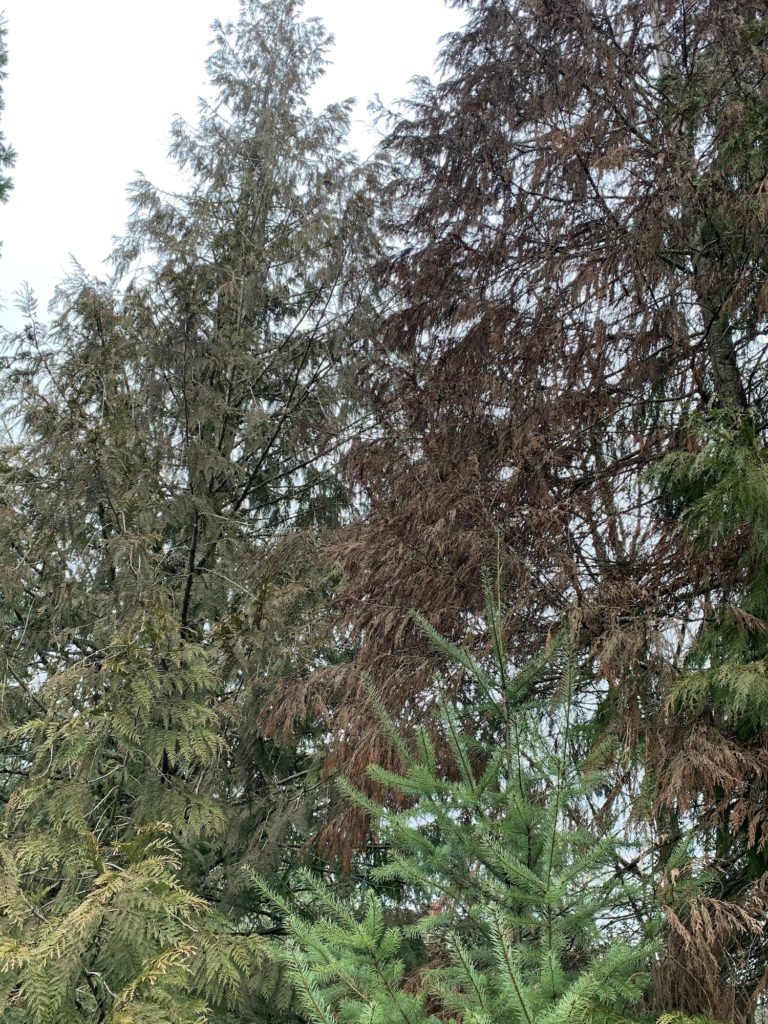
Why did my mature conifer (cone bearing) or deciduous (trees that lose their leaves in the fall) trees suddenly die? Arborists often get asked this question by grieving tree owners. This question deserves a serious answer, since an unbreakable bond exists between humans and trees, and when that link is unexpectedly broken, there are negative consequences for humans and the environment. This is because trees have such a large impact on our lives and often impact all types of human activities. Moreover, whether we are consciously aware of it or not, our lives are intertwined with trees, and even depend upon them for our survival, and when we lose them there are economic, social and cultural, emotional and environmental consequences. If we understand why trees die, maybe we can proactively help to keep them alive.
So why do trees die? And if we understand the reasons why they die, perhaps through wise and knowledgeable actions on our part, we can help to keep the trees in our lives alive longer. After all, as caretakers of this planet, it is our responsibility to care for the small piece of real estate over which we’ve been given stewardship including the trees on it. Face it, the simple fact is that without trees, all animal and human life will die!
With these things in mind, many years ago, as a tree care professional—in the industry, we’re called arborists—I felt that I was taking out too many trees that I knew were savable. Therefore, I rolled up my sleeves and got the necessary education, credentials, licenses and then purchased the equipment to begin providing plant health care services in my tree care company. Since then, I have saved hundreds, if not thousands of trees from their demise. This has been a rewarding activity for me on many levels.
But along the way, I have found that there is a belief among many of my clients that all trees have a life span and eventually grow old and die. For many people, this seems to explain why their yard tree suddenly died. Yet, in my decades as an arborist, I have found this belief usually to be unfounded. Since there are so many variable factors that contribute to tree mortality, it’s often not easy to determine why a tree has died without conducting extensive and costly forensics. Suffice it to say, many of the factors listed below combine to stress a tree, and if the tree doesn’t possess a sufficient reserve of stored energy to combat its stressors, it will eventually succumb to these stressors. Almost everything that a tree does is in slow motion. It grows slowly, its metabolic processes occur slowly and it usually dies slowly as well. On occasion, a tree dies quickly (in a few weeks or months), but this is rare. Like the rest of us, a tree has a strong survival instinct and wants to live. In fact, it contains many built in mechanisms to insure that it survives come what may. So to say that a tree has a certain life span and then it just dies is a misnomer. True, some trees are able to live for hundreds, even thousands of years, while other trees are relatively short lived, by comparison. But under the right conditions and with the right care, nearly any tree you plant in your yard can outlive you and probably your grandchildren too.
The Reasons Trees Die
So now let’s discuss why trees. The following is a list of some of the more common reasons of tree mortality.
Drought. Like humans and all animal life, plants need water to survive. No water, no life. Trees suck up an immense amount of water out of the soil on a continual basis, especially during the growing season. If they don’t obtain the water they need, the go into stress mode. If this continues long enough, they will slowly die of thirst.
Continue reading